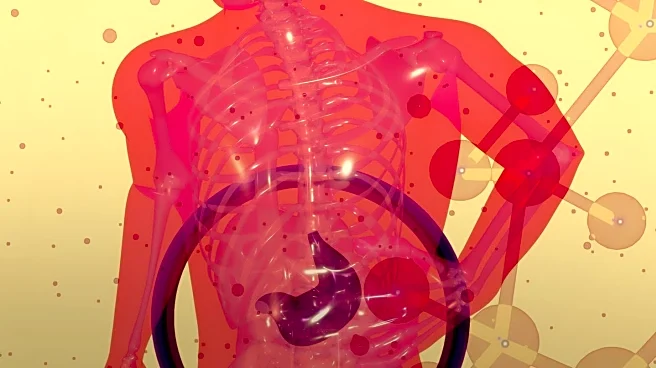What's Happening?
A study conducted by researchers at Aarhus University and the German Institute of Human Nutrition has revealed a significant link between stomach-brain communication and mental health. Published in Nature Mental Health, the study examined the synchronization between the stomach's electrical activity, known as the gastric rhythm, and the brain's frontoparietal network, which is involved in regulating emotions and attention. The research found that stronger synchronization between these two systems is often associated with poorer mental health, including conditions such as anxiety, depression, and stress. The study involved 243 participants and utilized electrogastrography (EGG) and functional magnetic resonance imaging (fMRI) to measure the electrical signals in the stomach and brain activity.
Why It's Important?
The findings of this study highlight the potential role of visceral-brain coupling in mental health disorders. Understanding the connection between the stomach and brain could lead to new therapeutic strategies for treating mental health conditions. This research suggests that targeting the gastric-brain axis might offer new avenues for interventions aimed at improving mental health by addressing the physiological underpinnings of emotional and psychological symptoms. The study's insights could benefit individuals suffering from stress-related conditions by providing a novel approach to treatment that focuses on the body's internal communication systems.
What's Next?
Future research may delve deeper into the mechanisms by which gastric-brain coupling influences mental health. This could involve exploring how specific mental health disorders are affected by these physiological interactions and developing targeted therapies to address them. The study opens the door for further investigations into how modifying gastric-brain communication could alleviate symptoms of anxiety, depression, and stress, potentially leading to innovative treatments that improve overall well-being.
Beyond the Headlines
The study underscores the importance of considering the body's internal communication systems in understanding mental health. It suggests that mental health is not solely a function of brain activity but is also influenced by physiological processes in other parts of the body. This perspective could shift how mental health disorders are perceived and treated, emphasizing a more holistic approach that integrates the body's various systems.










